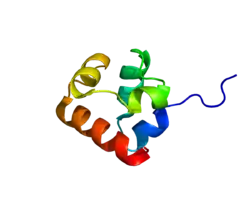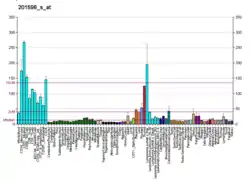INPPL1
SH2-domain containing Phosphatidylinositol-3,4,5-trisphosphate 5-phosphatase 2 is an enzyme that in humans is encoded by the INPPL1 gene.[5][6]
INPPL1 encodes inositol polyphosphate-5 phosphatase-like 1, a protein that in addition to the phosphatase domain contains an SH2 (src-homology domain 2) motif.[6]
Interactions
INPPL1 has been shown to interact with:
References
- GRCh38: Ensembl release 89: ENSG00000165458 - Ensembl, May 2017
- GRCm38: Ensembl release 89: ENSMUSG00000032737 - Ensembl, May 2017
- "Human PubMed Reference:". National Center for Biotechnology Information, U.S. National Library of Medicine.
- "Mouse PubMed Reference:". National Center for Biotechnology Information, U.S. National Library of Medicine.
- Hejna JA, Saito H, Merkens LS, Tittle TV, Jakobs PM, Whitney MA, Grompe M, Friedberg AS, Moses RE (February 1996). "Cloning and characterization of a human cDNA (INPPL1) sharing homology with inositol polyphosphate phosphatases". Genomics. 29 (1): 285–7. doi:10.1006/geno.1995.1247. PMID 8530088.
- "Entrez Gene: INPPL1 inositol polyphosphate phosphatase-like 1".
- Prasad N, Topping RS, Decker SJ (February 2001). "SH2-containing inositol 5'-phosphatase SHIP2 associates with the p130(Cas) adapter protein and regulates cellular adhesion and spreading". Mol. Cell. Biol. 21 (4): 1416–28. doi:10.1128/MCB.21.4.1416-1428.2001. PMC 99593. PMID 11158326.
- Dyson JM, O'Malley CJ, Becanovic J, Munday AD, Berndt MC, Coghill ID, Nandurkar HH, Ooms LM, Mitchell CA (December 2001). "The SH2-containing inositol polyphosphate 5-phosphatase, SHIP-2, binds filamin and regulates submembraneous actin". J. Cell Biol. 155 (6): 1065–79. doi:10.1083/jcb.200104005. PMC 2150887. PMID 11739414.
- Wisniewski D, Strife A, Swendeman S, Erdjument-Bromage H, Geromanos S, Kavanaugh WM, Tempst P, Clarkson B (April 1999). "A novel SH2-containing phosphatidylinositol 3,4,5-trisphosphate 5-phosphatase (SHIP2) is constitutively tyrosine phosphorylated and associated with src homologous and collagen gene (SHC) in chronic myelogenous leukemia progenitor cells". Blood. 93 (8): 2707–20. doi:10.1182/blood.V93.8.2707. PMID 10194451.
- Pesesse X, Dewaste V, De Smedt F, Laffargue M, Giuriato S, Moreau C, Payrastre B, Erneux C (July 2001). "The Src homology 2 domain containing inositol 5-phosphatase SHIP2 is recruited to the epidermal growth factor (EGF) receptor and dephosphorylates phosphatidylinositol 3,4,5-trisphosphate in EGF-stimulated COS-7 cells". J. Biol. Chem. 276 (30): 28348–55. doi:10.1074/jbc.M103537200. PMID 11349134.
- Habib T, Hejna JA, Moses RE, Decker SJ (July 1998). "Growth factors and insulin stimulate tyrosine phosphorylation of the 51C/SHIP2 protein". J. Biol. Chem. 273 (29): 18605–9. doi:10.1074/jbc.273.29.18605. PMID 9660833.
- Vandenbroere I, Paternotte N, Dumont JE, Erneux C, Pirson I (January 2003). "The c-Cbl-associated protein and c-Cbl are two new partners of the SH2-containing inositol polyphosphate 5-phosphatase SHIP2". Biochem. Biophys. Res. Commun. 300 (2): 494–500. doi:10.1016/s0006-291x(02)02894-2. PMID 12504111.
Further reading
- Pesesse X, Deleu S, De Smedt F, Drayer L, Erneux C (1997). "Identification of a second SH2-domain-containing protein closely related to the phosphatidylinositol polyphosphate 5-phosphatase SHIP". Biochem. Biophys. Res. Commun. 239 (3): 697–700. doi:10.1006/bbrc.1997.7538. PMID 9367831.
- Habib T, Hejna JA, Moses RE, Decker SJ (1998). "Growth factors and insulin stimulate tyrosine phosphorylation of the 51C/SHIP2 protein". J. Biol. Chem. 273 (29): 18605–9. doi:10.1074/jbc.273.29.18605. PMID 9660833.
- Pesesse X, Moreau C, Drayer AL, Woscholski R, Parker P, Erneux C (1998). "The SH2 domain containing inositol 5-phosphatase SHIP2 displays phosphatidylinositol 3,4,5-trisphosphate and inositol 1,3,4,5-tetrakisphosphate 5-phosphatase activity". FEBS Lett. 437 (3): 301–3. doi:10.1016/S0014-5793(98)01255-1. PMID 9824312. S2CID 22837416.
- Wisniewski D, Strife A, Swendeman S, Erdjument-Bromage H, Geromanos S, Kavanaugh WM, Tempst P, Clarkson B (1999). "A novel SH2-containing phosphatidylinositol 3,4,5-trisphosphate 5-phosphatase (SHIP2) is constitutively tyrosine phosphorylated and associated with src homologous and collagen gene (SHC) in chronic myelogenous leukemia progenitor cells". Blood. 93 (8): 2707–20. doi:10.1182/blood.V93.8.2707. PMID 10194451.
- Bruyns C, Pesesse X, Moreau C, Blero D, Erneux C (1999). "The two SH2-domain-containing inositol 5-phosphatases SHIP1 and SHIP2 are coexpressed in human T lymphocytes". Biol. Chem. 380 (7–8): 969–74. doi:10.1515/BC.1999.120. PMID 10494849. S2CID 42081112.
- Schurmans S, Carrió R, Behrends J, Pouillon V, Merino J, Clément S (2000). "The mouse SHIP2 (Inppl1) gene: complementary DNA, genomic structure, promoter analysis, and gene expression in the embryo and adult mouse". Genomics. 62 (2): 260–71. doi:10.1006/geno.1999.5995. PMID 10610720.
- Muraille E, Bruhns P, Pesesse X, Daëron M, Erneux C (2000). "The SH2 domain containing inositol 5-phosphatase SHIP2 associates to the immunoreceptor tyrosine-based inhibition motif of Fc gammaRIIB in B cells under negative signaling". Immunol. Lett. 72 (1): 7–15. doi:10.1016/S0165-2478(00)00162-0. PMID 10789675.
- Prasad N, Topping RS, Decker SJ (2001). "SH2-containing inositol 5'-phosphatase SHIP2 associates with the p130(Cas) adapter protein and regulates cellular adhesion and spreading". Mol. Cell. Biol. 21 (4): 1416–28. doi:10.1128/MCB.21.4.1416-1428.2001. PMC 99593. PMID 11158326.
- Wada T, Sasaoka T, Funaki M, Hori H, Murakami S, Ishiki M, Haruta T, Asano T, Ogawa W, Ishihara H, Kobayashi M (2001). "Overexpression of SH2-containing inositol phosphatase 2 results in negative regulation of insulin-induced metabolic actions in 3T3-L1 adipocytes via its 5'-phosphatase catalytic activity". Mol. Cell. Biol. 21 (5): 1633–46. doi:10.1128/MCB.21.5.1633-1646.2001. PMC 86709. PMID 11238900.
- Pesesse X, Dewaste V, De Smedt F, Laffargue M, Giuriato S, Moreau C, Payrastre B, Erneux C (2001). "The Src homology 2 domain containing inositol 5-phosphatase SHIP2 is recruited to the epidermal growth factor (EGF) receptor and dephosphorylates phosphatidylinositol 3,4,5-trisphosphate in EGF-stimulated COS-7 cells". J. Biol. Chem. 276 (30): 28348–55. doi:10.1074/jbc.M103537200. PMID 11349134.
- Dyson JM, O'Malley CJ, Becanovic J, Munday AD, Berndt MC, Coghill ID, Nandurkar HH, Ooms LM, Mitchell CA (2002). "The SH2-containing inositol polyphosphate 5-phosphatase, SHIP-2, binds filamin and regulates submembraneous actin". J. Cell Biol. 155 (6): 1065–79. doi:10.1083/jcb.200104005. PMC 2150887. PMID 11739414.
- Marion E, Kaisaki PJ, Pouillon V, Gueydan C, Levy JC, Bodson A, Krzentowski G, Daubresse JC, Mockel J, Behrends J, Servais G, Szpirer C, Kruys V, Gauguier D, Schurmans S (2002). "The gene INPPL1, encoding the lipid phosphatase SHIP2, is a candidate for type 2 diabetes in rat and man". Diabetes. 51 (7): 2012–7. doi:10.2337/diabetes.51.7.2012. PMID 12086927.
- Giuriato S, Blero D, Robaye B, Bruyns C, Payrastre B, Erneux C (2002). "SHIP2 overexpression strongly reduces the proliferation rate of K562 erythroleukemia cell line". Biochem. Biophys. Res. Commun. 296 (1): 106–10. doi:10.1016/S0006-291X(02)00787-8. PMID 12147234.
- Prasad N, Topping RS, Decker SJ (2003). "Src family tyrosine kinases regulate adhesion-dependent tyrosine phosphorylation of 5'-inositol phosphatase SHIP2 during cell attachment and spreading on collagen I." J. Cell Sci. 115 (Pt 19): 3807–15. doi:10.1242/jcs.00070. PMID 12235291.
- Tridandapani S, Wang Y, Marsh CB, Anderson CL (2002). "Src homology 2 domain-containing inositol polyphosphate phosphatase regulates NF-kappa B-mediated gene transcription by phagocytic Fc gamma Rs in human myeloid cells". J. Immunol. 169 (8): 4370–8. doi:10.4049/jimmunol.169.8.4370. PMID 12370370.
- Vandenbroere I, Paternotte N, Dumont JE, Erneux C, Pirson I (2003). "The c-Cbl-associated protein and c-Cbl are two new partners of the SH2-containing inositol polyphosphate 5-phosphatase SHIP2". Biochem. Biophys. Res. Commun. 300 (2): 494–500. doi:10.1016/S0006-291X(02)02894-2. PMID 12504111.
- Salomon AR, Ficarro SB, Brill LM, Brinker A, Phung QT, Ericson C, Sauer K, Brock A, Horn DM, Schultz PG, Peters EC (2003). "Profiling of tyrosine phosphorylation pathways in human cells using mass spectrometry". Proc. Natl. Acad. Sci. U.S.A. 100 (2): 443–8. doi:10.1073/pnas.2436191100. PMC 141014. PMID 12522270.
- Pengal RA, Ganesan LP, Fang H, Marsh CB, Anderson CL, Tridandapani S (2003). "SHIP-2 inositol phosphatase is inducibly expressed in human monocytes and serves to regulate Fcgamma receptor-mediated signaling". J. Biol. Chem. 278 (25): 22657–63. doi:10.1074/jbc.M302907200. PMID 12690104.
- Kaisaki PJ, Delépine M, Woon PY, Sebag-Montefiore L, Wilder SP, Menzel S, Vionnet N, Marion E, Riveline JP, Charpentier G, Schurmans S, Levy JC, Lathrop M, Farrall M, Gauguier D (2004). "Polymorphisms in type II SH2 domain-containing inositol 5-phosphatase (INPPL1, SHIP2) are associated with physiological abnormalities of the metabolic syndrome". Diabetes. 53 (7): 1900–4. doi:10.2337/diabetes.53.7.1900. PMID 15220217.
- Hughes AE, Bradley DT, Campbell M, Lechner J, Dash DP, Simpson DA, Willoughby CE (2011). "Mutation Altering the miR-184 Seed Region Causes Familial Keratoconus with Cataract". The American Journal of Human Genetics. 89 (5): 628–33. doi:10.1016/j.ajhg.2011.09.014. PMC 3213395. PMID 21996275.
This article is issued from Wikipedia. The text is licensed under Creative Commons - Attribution - Sharealike. Additional terms may apply for the media files.





